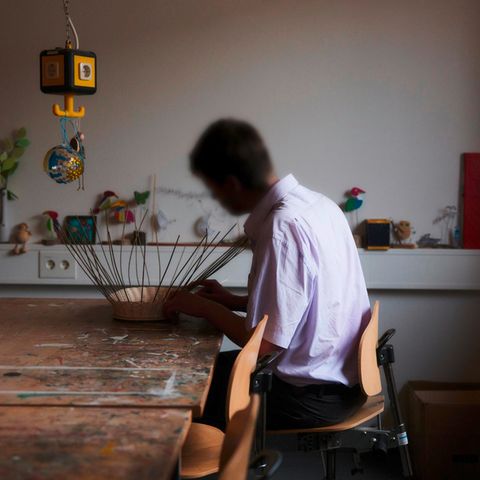Novel debut
“My family tree is affected by pretty much every plague”
Copy the current link
Add to the memorial list
Leon Engler’s “Botany of Madness” should be interested in anyone who is afraid of his family’s psychosis. The psychologist Engler and his main character have some things in common.
He trusted the neighbor in Vienna for the first time. He was afraid to get crazy – because so many of the family were ill. The neighbor just laughed. The two drew a family tree and rolled over the probabilities.
“Schizophrenia? Search? Depression? Bipolar disorder? My family tree is infected by pretty much every plague that can be found in the Bibles of psychiatry. In whose footsteps should I kick? Which stray line will continue?”
The grandfather: a waiter who fell into madness
The first-person narrator will be in the novel Botany of madness Just named first name: Leon. Just like the author. There are more agreement. Both have red hair. Both grow up in Munich. Both live and later study the same subjects in Vienna, the birthplace of the grandfather- a waiter who spent his last years of life homeless and was repeatedly instructed to the Lower Austrian State Healing and Nursing Institute for nerve and mentally ill “Am Steinhof”, diagnosis of schizophrenia.
Both discover the history of this grandfather in search of the roots of mental suffering in their families – families that come from the working class. They “have no history, no tradition, no oral legends”. Both are driven in their innermost to snatch the deceased of this historiclessness.
Yes, maybe this impressive novel debut is actually a “family history that has been out of hand”, as it says in the blurb and is a legitimate question: that of the author or that of the narrator?
Family history: people are reduced to the pathological
The family history is a field on the patient-admission form in psychiatric clinics, in which a few lines of text fit the mental disorders of mothers, fathers and other relatives. Is kept secret, what these people really did, who they loved, what distinguished them, what successes they celebrated and how they failed. People are reduced to the pathological.
The first-person narrator, who-like the author-decides to study psychotherapists after studying psychotherapists, has a problem. What should he enter in family history, he asks the senior psychologist of the Psychiatric State Hospital on his first working day: “The whole family history? Or just the mental illness?” She just says: “You can do that.”
Psychiatry: “The goal is not that people are happy”
The fictional Leon wants to write down his own family history while he learns to diagnose and treat psychiatric diseases. The senior psychologist, sometimes also his mentor, always gives him advice, sentences with the shelter, who are remembered.
Nine sentences that should not be said with depression

“You just have to think more positively / worry less.”
What Dr. Jähne, psychiatrist, says: “This is exactly what the patient cannot do, he cannot exhaust this negative thinking. There is also the difference between sadness and depression. During depression, you are beyond this threshold, where you can no longer perceive positive emotions, and a lot, much, much, negative – such as fear or anger.”
© Getty Images
More
Open the image subtitle
Back
Further
For the raging or suicide -prone patients on the closed: you can’t change anything anyway, just accompany the change. “And don’t hang the latte too high here. The goal is not that people will be happy. I am not either.” For the patients at the depression station: “Never try to cheer them up.” Leon wants to know what to do instead: “Ask how it can get worse.” Or for the patients on the addiction station: “Drinking is not the problem, but the interim solution.”
When the narrator leaves the hospital a year later, he is not finished with his family history. He is still doing the same questions: Why, for example, his own mother became severely depressed after a steep success career and drank liter by liter by wine – although she tried everything to become different from her mother, Leon’s grandmother, who sank into deep sadness at a young age? The mother opposed her possible fate an “orthodox optimism”. “She laughed, beamed and trusted everyone.” But at some point she became tired of her success – and started drinking. Leon comes to mind an explanation of the Viennese neighbor, who has long since died at this point: “As soon as people have enough what they can live, it turns out that they do not know what they live for.”
But is that enough to understand? In the Stern interview, the author Leon Engler speaks of the “intrafaminous repeating compulsion”-a technical term from family therapy. Today one could speculate wonderfully where this now scientifically proven, fateful slope comes from some people to go on the path paved by ancestors. Does it have to deal with the educational style or dealing with each other in the families? Or maybe with the activation state of genes? Our inheritances can also be influenced by trauma, according to the realization of epigenetics.
Middle Ages: were laid as insane on chains
There are no technical terms like this in the novel. “I will discuss this in a non -fiction book,” says Engler. When he started writing five years ago, it was soon clear that there would be two books. From the novel, he then deleted explanatory pages. But there is enough left: Numerous well-known psychotherapists, writers and philosophers are quoted, there are excursions in psychiatric history and the Middle Ages, when the “crazy” placed on chains and were exhibited in “daring” or “fool’s house” at the city gates.
The question remains: what really happened, where does the fiction begin? He reconstructed the story of his grandfather as well as possible, says Engler. Even after a long search, he found his medical record in the Vienna State Archives and literally quoted from it.
But Engler, deep -blue eyes, firm look, striking face, is different than the fragile, whipped narrator plagued by doubt and loneliness. “In contrast to him, I appreciate myself as a very resilient.” We walk through the Munich district of Munich on a late summer day, where a grandmother Engler grew up in a hostel house and later became depressed. But she already deviates greatly from the character of the novel, and Engler never lived under one roof with her. His alter ego drove the fear “that her madness could overrange to me” – Engler never had such fears.
The novel: border gear between fiction and autofiction
But why does so much flow from your own history into this novel? “This border passage between fiction and life experience excites me,” says Engler. “Researched novels often know the facts, but not the little worlds in which life really plays.” The confusion mastered his literary role models, authors such as Max Frisch or Ingeborg Bachmann.
It is also questionable whether one can draw a clear border to true history and memory at all. “Fact or fiction, memory or imagination – the boundaries are fluid anyway. Literature, psychology and memory research agree,” says Engler.
There is not one past, but many stories. The novel ends: “It is a version of this story, you could write a thousand different ones. Maybe it was, maybe.”
Engler has succeeded. The novel is highly demanding, penetrating to the basic existentialist questions, is full of suggestions to enter the soul science. Nevertheless, he puts you in a good mood, his language is concrete and highly poetic at the same time, and he comes so exhilarated and entertaining that it is ideal as a vacation reading.
Source: Stern
I’m Caroline, a journalist and author for 24 Hours Worlds. I specialize in health-related news and stories, bringing real-world impact to readers across the globe. With my experience in journalism and writing in both print and online formats, I strive to provide reliable information that resonates with audiences from all walks of life.





